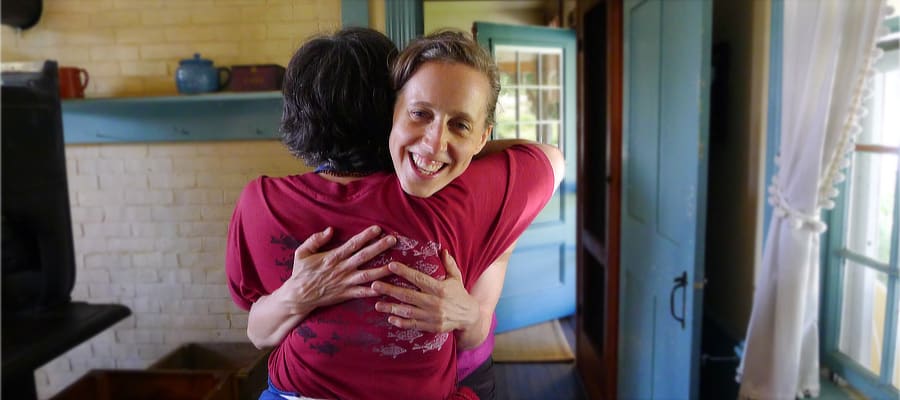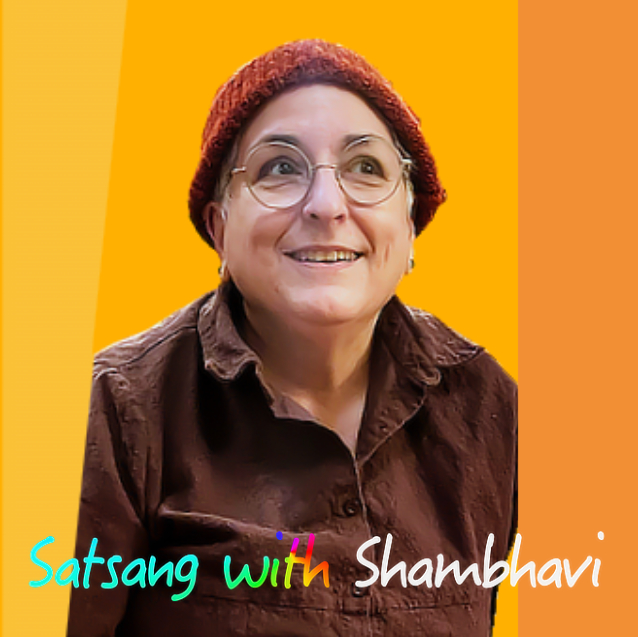You can just be ok with your real condition. Humility, modesty, and sobriety are the antidotes to pride and jealousy. A podcast from Satsang with Shambhavi
SHAMBHAVI
So, someone said on our slack today that they were relieved because everyone in our community was on an even plane, sort of like a field of graphic dots on graph paper. And this was relieving.
Now, this is true in an absolute sense that everyone has totally equality. But I want you to think of half-tone photographs. Does everyone know what those are?
Like photographs that are created out of little dots, and they rely on an optical trick because of the physiology of our eyes translates into a solid image, even though it's actually made up of tiny little dots.
So you have this field of dots, but then arising out of it is this very unique picture, and that's actually more accurate if we want to include both the absolute and the relative view of what is happening among people.
So there are many people in our community and this applies to anyone and everyone—it's not just applying to our community—where we have total equality in the sense that we are all made of and full of enlightened essence nature. But that enlightened essence nature, that unconditioned essence nature is giving rise to all of this variety out of itself.
And this is what Ma meant when she said the music that you hear depends on how you play the instrument.
For her, of course, everyone was just God, but she was still, even in her condition, recognizing the unique dimension of each person and the unique relationship that happens between every student and every teacher.
How you relate to the teacher is the cause of what you receive back as music. So I just wanted to say that.
And then the other important part is that we live in this unbelievably competitive culture, and most of you are really subject to a lot of suffering because of that.
That competitiveness leads to competitiveness between students, whether spoken or unspoken and also competitiveness between students and me, whether spoken or unspoken.
The other aspect of this discussion that happened today on our community slack is that a couple people expressed that they felt more relaxed thinking of the community as this field of homogeneous dots where everyone was equal—equally there, or equally important, or equally—I don't know equally what. But in any case, that is not what is going to relieve you of that suffering.
Simply convincing yourself that everyone is the same in some respect, that's just a band-aid.
And that is also just the flip side of pride. Like everybody has to be equal to you in some way.
So I don't want anybody to be under any illusion about that. You can't just talk yourself into this fantasy world where there aren't going to be people who are better at things than you are, or there are going to be people who have closer relationships with the teacher than you do.
Or there aren't going to be people who want to practice more than you do, and you have some vision of yourself as you wish you were a great practitioner, but you don't actually want to do it.
But now you're jealous of people who are doing it, and you're relieved if some people aren't doing it because then you feel less threatened by them. “Oh, it's so great. We're both in the same boat. We both hate practicing. Yay.”
You know, and this is all just a big mess. So, I mean, [laughter] it is ridiculous. It's basically saying 'I'm so jealous that I need to convince myself that everyone's on the same plane in order to feel okay with myself.'
I've had students tell me things like, I'm jealous of you because you have a PhD. If I gave up my PhD, would that make them less jealous people? Less competitive people?
It wouldn’t do anything. They’d just find the next person with a PhD to be jealous about.
So this is all pride. It's all pride.
And what is actually different from pride is humility, modesty. Sobriety about yourself, just being able to experience pleasure in someone, maybe having more practice under their belt than you do.
I had various teachers and some of those teachers, I was close to them and some of them, they were just a distant figure on a throne, and I was just in the audience. I had no real personal relationship with them, and I always enjoyed watching their relationships with their close students.
It was instructive. It was inspiring.
I didn't sit there and think. “Oh. Look at them, they're probably faking it.” I had somebody say that to me once, too.
A student really broke down and was crying in my arms. And then that went on for a while. And then later on, some other student came up to me and said he was just faking it. This is just like pure jealousy and kind of insanity, and there's no cure for that in external things. There's no way that external things can be arranged to make you not experience that.
The only thing that can make you not experience that is actual modesty and actual humility, and actually being okay with yourself enough to enjoy the successes of other people and be able to learn from and feel inspired by people that have more capacity than you do, including your teacher.
So I just wanted to put that out there because I think it's an important thing to note and hope some of you think about this.
If we go back to Ma’s saying that the music you hear depends on how you play the instrument, the instrument being her. If we have an instrument, sometimes it's playing louder, sometimes it’s playing softer, sometimes faster, sometimes slower. I mean, music is variety. It's not just one note.
And the real solution to everybody suffering around this is to relax enough so that you can enjoy other people's accomplishments, and not feel threatened by them.
And so that you can also have accomplishment and not use it to make yourself feel superior to other people, and so that you can just be more sober about whatever condition you're in and go on from there without feeling like it makes you better or worse than anybody.
I'll just tell a story. There's so much beauty you miss out on if you're worried about someone’s closer to the teacher than you are. So much beauty you miss out on.
I went to a retreat. It was with a Buddhist teacher that I have no relationship to, although now I do in a heart sense. But I spent no private time with him.
I was not one of his close students, and I was sitting in the audience and, of course, in the front row where all of his more close students. And he had this one young woman student who was sitting in the front row, and he just sort of nodded to her, and she got up and started doing the dance of the Vajra yogini.
And I was watching his face, watching her. It was just so full of melting tenderness, and his face was just so exquisite while he was watching her.
Obviously, it burned itself in my memory, in my heart, that this teacher had such incredible love for the student, such respect for her. And was so proud of her and mesmerized by her.
It was beautiful and wonderful. And if I’d been sitting in the audience instead thinking, “oh, my God,” you know, whatever I was thinking, “there's such an inner circle here. I don't like lineages with inner circles. I'm out of here.” These things are all natural.
Of course, I've had a teacher, and there are teachers who use various hierarchies to control people. And that's not nice. That's not good. And it doesn't taste sweet. But that's just manipulation.
But that's never been the case here. Never. Not as far as I know. And I certainly abhor that kind of thing. So I can't imagine it's been the case.
STUDENT 1
Hey Shambhavi?
SHAMBHAVI
Yes.
STUDENT 1
So the way that you started out satsang today got me thinking about times where I felt jealousy in this community, about other students’ relationships with you and also just in life in general.
And I feel like kind of my strategy, which I thought was a good one but now I’m questioning it, is to sort of feel what I love in my own life, and what I‘m grateful for in my own life, and then I do find that I have a greater capacity just to enjoy what somebody else is, accomplishments or benefits that they have.
But I feel like from what you said, I sort of feel like that there's a way in which that is still coming back in…
SHAMBHAVI
Trying to assuage.
STUDENT 1
…trying to make me feel better.
SHAMBHAVI
Yeah, definitely. So you made me remember something, and I think, like taking it out of your personal story to somebody else will help you to see this a lot more clearly.
But one time there was a very young Sanskrit scholar. He was still in his master's program. And he came to my former spiritual community to give some sort of a talk. I can't remember what it was about, but something to do with Trika Shivism.
And you could tell this young man was really nervous. He just didn't have a lot of experience giving public talks. And he had everything written out and he had his computer there, and he didn't feel comfortable extemporizing at all.
So then at some point, he was writing some Sanskrit. And I could tell my teacher at the time, who was really Titan-y and really competitive, I could tell from the minute this young man came into the room that my teacher was feeling competitive and nervous and kind of on edge.
I just could feel his energy shift.
And when this young man started writing Sanskrit on the board, my teacher said, l"ook, his hand is shaking. He can't even write well."
It was like so ridiculous. And I said, he's really young. He's just in school. He's not experienced with this. That's why.
And then at another point, my teacher said, 'Well, he can read Sanskrit in the original. But I've studied with Himalayan Masters." He literally said that.
You know, it's the same thing. It's still trying to make it like, there's some balance in accomplishment, right? Instead of just "I don't read Sanskrit, you know why? Because I didn't study it." [laughter]
So, yeah, it's like, be okay with that. Be okay with your real condition.
So I know one of the things you were jealous of because you mentioned it to me. I won't repeat it here. But another thing would just be, “Oh, look how beautiful, Shambhavi is collaborating with this other student and not with me. But that's okay.” And even, “I feel sad about that. I wish it were me.” But move on. As you said, don't try to just like go, “But I'm this other thing that's just as good.”
All of this is impermanence.
STUDENT 1
Yeah. I think with that particular situation, something that helped was stepping back and being like, "Wow, I'm having ugly feelings towards people I love," and feeling how foreign that was to me. And then I just sat with that discomfort. And then it did somehow get digested.
SHAMBHAVI
Yeah, but you don't want to have to keep digesting those moments over and over again. You know what I mean?
So just having the humility, the modesty to be like, “Maybe I don't even know why this other person is doing something with Shambhavi that I wish I were doing with Shambhavi. Maybe I don't even have an explanation for it. But that's life.”
Really humility, modesty—that's just the way things are.
Some people are doing one thing with the teacher, some people are doing another thing with the teacher. There's nothing more to say about it. And when feelings do arise, yeah, you want to try to digest them, but you don't want to keep doing that for the rest of your life. It would be nice if they didn't arise at all because actual modesty had set in. [laughter] Poisoned by modesty.
STUDENT 2
Hi again.
SHAMBHAVI
Hi.
STUDENT 2
I'm not sure if this is an approach to jealousy—a way where you’re sort of seeing where you could go in the circumstance. Like you're seeing what could be in the other person—like that would be really lovely if I could get there somehow. It's kind of a window into maybe something that I could follow, that one could move towards. I was curious.
SHAMBHAVI
Sure. I love reading stories of gurus and disciples. I've been reading them since I ever started being a student of a spiritual teacher, and they inspire me, and they have totally informed how I show up.
It's like I see those incredible examples of students and teachers, and I always wanted to be that kind of student. I always wanted to be that kind of disciple.
It wasn't so much of like I wish, or wouldn't it be nice?
It's more like, yes, I am going to try for that.
That feels like it's really who I am, and I'm going to do my best to embody that, but as something to come into, to grow into, for sure. So I think there's that.
But then there's people that, and there's so many examples of that in our lives, of people who embody something that we resonate with that we try to then embody in ourselves. And that's a wonderful function.
That's how I would hope people would relate to a lot of different circumstances, but has to resonate with you.
But there's another circumstance where—and maybe this is not so much competitive as more of a hungry ghost thing—where someone says, “Oh, I wish I could be like that,” or “I could but if only," or "I could, except for the fact that I'm not.” Or something.
And then they get into this sort of mourning, longing, sadness thing, feeling badly about themselves and feeling ashamed. And that's also to be discarded, if at all possible. That kind of pattern. That's also immodest, in a sense. Also very painful.
But being inspired by people who bring out things in you that are things you can embody more fully, that's wonderful.
Sign up to receive email updates
Enter your name and email address below and I'll send you periodic updates about the podcast.


